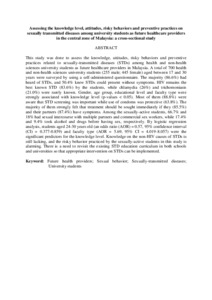Citation
Folasayo, Adigun Temiloluwa and Oluwasegun, Afolayan John and Samsudin, Suhailah and Saudi, Siti Nor Sakinah and Osman, Malina and Awang Hamat, Rukman
(2017)
Assessing the knowledge level, attitudes, risky behaviors and preventive practices on sexually transmitted diseases among university students as future healthcare providers in the central zone of Malaysia: a cross-sectional study.
International Journal of Environmental Research and Public Health, 14 (2).
art. no. 159.
pp. 1-14.
ISSN 1660-4601
Abstract
This study was done to assess the knowledge, attitudes, risky behaviors and preventive practices related to sexually-transmitted diseases (STDs) among health and non-health sciences university students as future healthcare providers in Malaysia. A total of 700 health and non-health sciences university students (255 male; 445 female) aged between 17 and 30 years were surveyed by using a self-administered questionnaire. The majority (86.6%) had heard of STDs, and 50.4% knew STDs could present without symptoms. HIV remains the best known STD (83.6%) by the students, while chlamydia (26%) and trichomoniasis (21.0%) were rarely known. Gender, age group, educational level and faculty type were strongly associated with knowledge level (p-values < 0.05). Most of them (88.8%) were aware that STD screening was important while use of condoms was protective (63.8%). The majority of them strongly felt that treatment should be sought immediately if they (85.5%) and their partners (87.4%) have symptoms. Among the sexually-active students, 66.7% and 18% had sexual intercourse with multiple partners and commercial sex workers, while 17.4% and 9.4% took alcohol and drugs before having sex, respectively. By logistic regression analysis, students aged 24-30 years old (an odds ratio (AOR) = 0.57, 95% confidence interval (CI) = 0.377-0.859) and faculty type (AOR = 5.69, 95% CI = 4.019-8.057) were the significant predictors for the knowledge level. Knowledge on the non-HIV causes of STDs is still lacking, and the risky behavior practiced by the sexually-active students in this study is alarming. There is a need to revisit the existing STD education curriculum in both schools and universities so that appropriate intervention on STDs can be implemented.
Download File
![[img]](http://psasir.upm.edu.my/60938/1.hassmallThumbnailVersion/Assessing%20the%20knowledge%20level%2C%20attitudes%2C%20risky%20behaviors%20and%20preventive%20practices%20on%20sexually%20transmitted%20diseases%20among%20university%20students%20as%20future%20healthcare%20providers%20in%20the%20central%20zone%20of%20Malaysia%20a%20cross-sectional%20stu.pdf)  Preview |
|
Text (Abstract)
Assessing the knowledge level, attitudes, risky behaviors and preventive practices on sexually transmitted diseases among university students as future healthcare providers in the central zone of Malaysia a cross-sectional stu.pdf
Download (6kB)
| Preview
|
|
Additional Metadata
Actions (login required)
 |
View Item |

